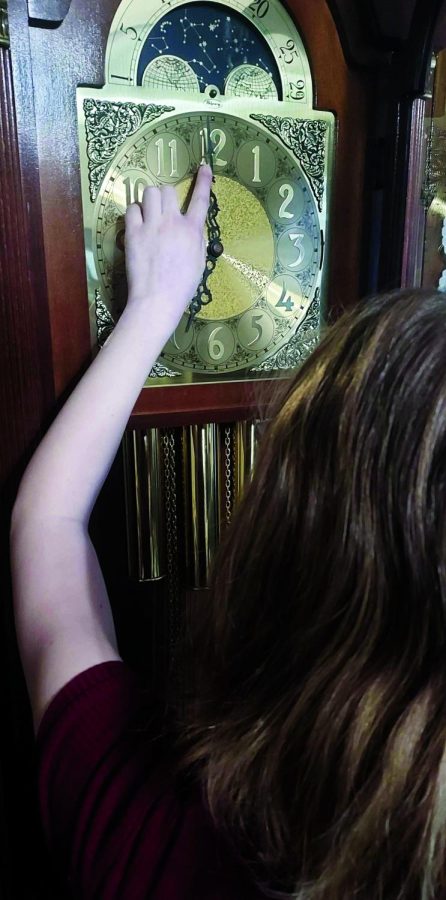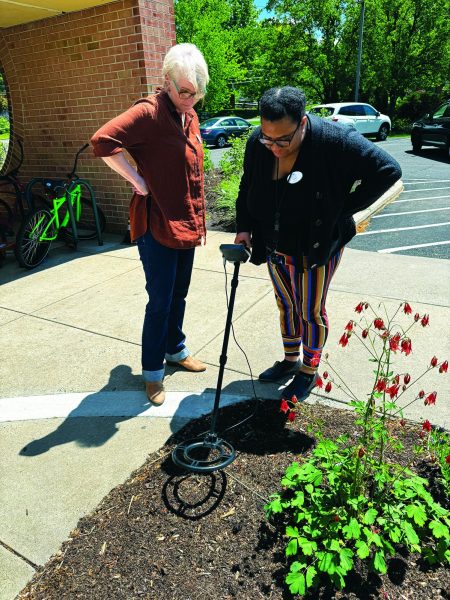Sunshine Protection Act may impact daylight savings time
The Sunshine Protection Act may make daylight savings time permanent.
Turning time forward…Adjusting the time on the grandfather clock to be in line with daylight savings time, freshman Alaina Bagby sets the clock forward for spring on Sunday, March 13.
Moving onto The House of Representatives, the Sunshine Protection Act is making progress towards being put into action.
With this act, U.S. citizens may no longer be switching their clocks forward and backward twice a year.
The U.S. Senate has already voted to put this law in place by November 2023.
The House of Representatives must still pass it before it can go on to President Biden to be signed.
“The change would help enable children to play outdoors later and reduce seasonal depression, according to supporters” Reuters reporter David Shepardson wrote.
Science teacher Kim Wilson believes daylight savings impacts people more than they understand.
“A lot of the way our bodies function has to do with the timing of sunlight and timing of the seasons,” Wilson said, “and our bodies have adapted over hundreds of thousands of years to that.”
According to Wilson, during the two weeks after the daylight savings time change, people are more tired, more likely to get into accidents, and are less productive.
Besides those two weeks following time changes, there isn’t going to be a “tremendous difference” after the new law.
Sophomore Adam Turano thinks that having this law will be more “convenient” for people.
“I think the benefits outweigh the withdrawals,” Turano said. However, it may be difficult for some to adjust to losing an hour.
“We don’t have that extra hour, so doing things might feel a little bit cramped at first and you might feel like you don’t have enough time,” Turano said, “but at the same time I think it’s more convenient for people to live their lives.” Others don’t think it will significantly contribute to their daily lives.
“I’m a little bit indifferent to it to be honest because I don’t think it will affect my day-to-day life,” senior Madison Coradi said.
She would not be against it since it might not have a big impact on people’s personal lives. “I don’t think it affects anyone personally, so I wouldn’t be opposed to it,” Coradi said.
One reason some people may be opposed to it is because of how dark it will be in the morning.
“A few people who have children in school are concerned about it because their kids will be waiting for the bus in the dark in the morning,” Franconia Township resident Scott Miller said.
According to Coradi, people might not be looking forward to the new act simply because they don’t like change.
“There will always be people who are against change,” Coradi said.
Since daylight savings has been around for some time, people might want to have it remain in place because it is what they are used to. “Some people are just stuck in their ways and they think the way things have always been should be the way things always are,” Wilson said.
Life will be “easier” for the rest of the world, according to Turano.
“I think that honestly, people will get used to it,” Turano said. Daylight savings time has a large impact on health, especially sleep cycles. Biologically, daylight savings time is not good for the body’s circadian rhythm, which is its natural timing.
“You have an internal clock that recognizes when you should be asleep and when you should be awake. That’s usually on a 24-hour cycle,” Wilson said.
Wilson explained that people should be getting eight hours of sleep and 16 hours of activity.
“If you don’t keep that sequence it messes up your circadian rhythm and messes up all the processes in your body that are required for proper health and functioning,” Wilson said.
The law will also help with people’s overall well-being and health because they will be exposed to more sunlight. “There is a study that shows that in winter, depression is caused by a lack of sunlight. So if they started to increase the amount of sunlight people receive in the winter it would be helpful,” Miller said.







